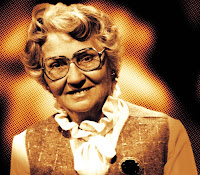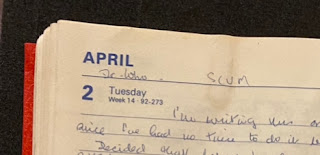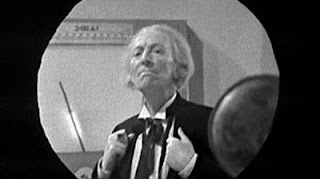Disgusted, Mary Whitehouse will be broadcast on Radio 4 on Saturday 5 March. Produced by me and brother Thomas, it’s presented by Samira Ahmed who has spent months researching Whitehouse’s diaries, now in the collections of the Bodleian Library in Oxford; Samira has written a blog post about it all. For our programme, we spoke to Whitehouse’s granddaughter Fiona, to critics Michael Billington and Nicholas de Jongh, and to actor / director Samuel West. Oh, and Lisa Bowerman is amazing as Mary Whitehouse.
I’ve spent weeks going through the BBC archives for suitable clips to use. The earliest surviving example is from 5 May 1964, a news report about the Clean-Up TV event held at Birmingham Town Hall, where Whitehouse was one of the speakers. The clip of Whitehouse is brief but quite well known:
“Last Thursday evening we sat as a family and we saw a programme that started at six thirty-five and it was the dirtiest programme that I have seen for a very long time.”
The consensus seems to be that this dirty programme was a Scottish sketch show, Between the Lines, starring Tom Conti and Fulton Mackay. On the edition of 30 April, Conti met an attractive woman at a dance and we then heard his internal monologue. Sadly, the episode seems to be missing from the archive, so we can’t tell how “dirty” it was. We can’t judge the language used, the tone of it, the general effect.
Surely, one would think, a programme shown at 6.35 in the evening couldn’t be too rude. And yet there’s lots in old telly that was thought innocuous at the time but seems remarkable now. The Wheel of Fortune is an episode of Doctor Who written by David Whitaker and first broadcast at 5.40 pm on 10 April 1965. It includes a scene in which a man called Haroun helps companion Barbara Wright to hide from some soldiers. Haroun leaves Barbara with his young daughter, Safiya, while he goes to look for a safe route out of town. He gives Barbara his knife: if she thinks the soldiers will find them, she is to kill Safiya and then herself. Barbara protests, but Haroun persuades her:
You would not let them [the soldiers] take Safiya?
No, of course I wouldn’t!
Then I'll leave the knife.
It’s an extraordinary thing to include in a family drama aimed at kids aged 8 to 14, and just one of several examples from early Doctor Who where Barbara is under threat of sexual violence.
Right from the beginning of Doctor Who, there had been questions about how suitable it was for children. Opinion on this was “strongly divided” at the executive meeting of the BBC’s Television Programme Planning Committee on 4 December 1963 - after just two episodes of the series had been broadcast. The following week it looked like the programme might be moved to a later time in the schedule, though this was over-ruled by Head of Drama (and co-creator of Doctor Who) Sydney Newman.
Then, on 12 February 1964, at the same committee Donald Baverstock (Chief of Programmes, BBC-1, listed in minutes as “C.P.Tel”) thought one scene in The Edge of Destruction - in which the Doctor’s granddaughter Susan attacks a chair with a pair of scissors while in the grip of some kind of madness - might have breached the BBC’s own code on depictions of inimitable violence. Baverstock’s then boss, Stuart Hood, later wrote that the BBC’s code of practice on violence in television, drawn up in 1960, was.
“a remarkably sane and enlightened document, which acknowledged the fact, for instance, that subjects with unpleasant associations for adults will often be taken for granted by children and vice versa. ‘Guns … and fisticuffs may have sinister implications for adults; seldom for children. Family insecurity and marital infidelity may be commonplace to adults; to children they can be deeply disturbing.’” (Stuart Hood, A Survey of Television (1967), p. 90.)
That reference to guns is interesting in the light of Mary Whitehouse’s first-known objections to Doctor Who. Whitehouse believed that depictions of sex and violence on TV had a corrupting effect on the viewer, and led to an increase in sexual and violent crime more broadly. She gave some examples of this in an interview with the Daily Mirror on 29 November 1965:
“‘I know a 14-year-old girl who was so physically affected by a sexy play that she went out and offered herself to a 14-year-old boy. … And I know a boy who listened to a doctor expounding the virtues of of premarital sex and went out and got VD… I mean, where is it going to end? We've even got the Daleks in Dr. Who—a children's show, mind you—chanting 'Kill, kill, kill.' One day a youngster is going to go out and do just that…’ AT this point MRS. FOX said something that sounded like ‘twaddle.’”
That’s Avril Fox, “mother and Harlow councillor”, contesting Whitehouse’s claims. I found several examples of this in the archive, too: Whitehouse claiming to represent the views of ordinary people, and then ordinary people quickly saying she didn’t speak for them. (We use one example in our documentary, from an episode of Talkback on 7 November 1967 in which Whitehouse and other members of the public responded to Stuart Hood and the claims made in his book, not least that most people who write into TV companies are “cranks”.)
I also found several examples of Whitehouse conflating what are surely different issues, such as in this case undercutting her point about protecting children from sexualised content by equating it with the supposed effects of fantasy violence. Yes, children mimic Daleks - that’s part of the Daleks’ appeal - but they don’t then go on to kill people. Suggesting they do undercuts the whole argument; the serious point about sexualised content is also dismissed as twaddle.
There’s a third characteristic: that Whitehouse may have been complaining about something she’d not actually seen. The Daily Mirror interview was published two days after the broadcast of Devil’s Planet, an especially notable episode of Doctor Who in that it killed off a companion. But Katarina is not killed by Daleks; she is ejected from a spaceship airlock. The Daleks do appear, and execute a wicked alien called Zephon, but there is no chanting of “Kill”.
Famously, the Daleks don’t chant “Kill”, but prefer the term “Exterminate”. One Dalek does repeat, “Kill, kill, kill, kill, kill,” in the episode Flashpoint (broadcast 26 December 1964), so either Whitehouse was remembering that untypical sequence from a year before, or she invented the thing she criticised - perhaps repeating what other people said about the Daleks, rather than what she’d observed herself. (As we detail in our documentary, she consciously chose not to see The Romans in Britain at the National Theatre, but led a private prosecution against its director for a scene in it that she considered to be grossly indecent.)
In her later criticism of Doctor Who, Whitehouse was more specific - and effective. Since m’colleague Jonathan Morris wrote about this in more depth in his 2003 feature for Doctor Who Magazine, “Sex and Violence”, a wealth of press clippings have been posted on the Doctor Who Cuttings Archive relating to Mary Whitehouse. Planet of the Spiders (1974) had, she claimed, led to an “epidemic” of “spider phobia” in children. In Genesis of the Daleks (1975),
“Cruelty, corpses, poison gas, Nazi-type stormtroopers and revolting experiments in human genetics are served up as teatime brutality for the tots.” (The Mirror, 27 March 1975)
She was concerned about specific scenes in The Brain of Morbius and The Deadly Assassin (both 1976), and could vividly recall them almost 20 years later when interviewed, on 22 November 1993, for the documentary Thirty Years in the TARDIS. Director Kevin Davies kindly provided me with a longer version of that interview, though we couldn’t make it fit in our programme:
“Now, there’s one particular programme - and I can see it still in my mind’s eye - where Doctor Who, the final shot of the episode, was Doctor Who drowning. And these sort of images, the final shots of the programme, with the image that was left in the mind of the child for a whole week, not knowing whether his beloved Doctor Who or whatever would have drowned or not have drowned. And another programme finished with a girl who was with him, and she had a pincer put around her neck. And the holding of that pincer round her, again, was the last shot. And to me, I think it’s extraordinary that people with the brilliance, in many ways, in making a programme of that kind couldn’t have extended their awareness not only to their cameras or all the rest of it, but to the effect of what they were doing upon the children who were receiving it. That was almost as thought they were a bit dumb in that area.”
Back in 1976, and following her criticism, the last shot of the drowning scene was cut from the master tape of the episode by the programme’s then producer. On the 30 Years documentary, a subsequent producer says he secretly hoped Mary Whitehouse would complain about his Doctor Who because it was always good for viewing figures; yet her complaints about violence in the series in his time overseeing the series were used as justification when the programme was then taken off the air. Today, Doctor Who isn’t shown so early in the evening and - I’d argue - is marketed much less as a show for children. I find myself wondering how much that sort of thing is in the shadow of Mary Whitehouse.
Going through her diaries, I found a number of other things. There’s the entry in the 1985 diary where she has two concerns about recent television: her discussions with Michael Grade, then Controller of BBC-1, about violence in the recent season of Doctor Who and the legal judgment on yet another private prosecution she’d brought, this time about the broadcast on Channel 4 of a controversial film set in a borstal. So the page is headed “Dr. Who - SCUM”
And another one I noted. On 18 March 1982, the legal case against The Romans in Britain was withdrawn. Mary Whitehouse was on that evening’s Newsnight to discuss the case, and spent most of her time correcting what she felt were errors in the reporting. Then, interview done, the cameras wheeled away to the other side of the studio for further discussion of the case, with Joan Bakewell speaking to Sir Peter Hall from the National Theatre and Sir Lois Blom-Cooper.
Again, Whitehouse thought what they said was wrong. In her diary, she says she asked the presenter who’d just interviewed her if she could intercede. The presenter checked with the producer who said no. So Mary Whitehouse heckled anyway.
“Whereupon the cameras came chasing across the studio, like a lot of Daleks, leaving Joan Bakewell and her guests in darkness! … I came fully onto the screen as I was saying my bit.” (Mary Whitehouse, diary entry for events of 18 March 1982, written on the page for 10 March 1982)
I was really struck by that moment - and that telling word. Alas, as the Daleks close in on Mary Whitehouse for this hero moment, she’s not clutching her lapels.












2 comments:
I'm looking forward to your programme. Sadly, it was another producer working on the original TV version of my docu 'Thirty Years in the Tardis' who went to Mary's house to interview her, whilst I was locked into the edit. But I spoke to her on the phone twice whilst re-editing the show for VHS the following year. Her husband answered, guardedly checking who I was. I gather she used to get many abusive calls. I treated her with respect and as she'd just retired I was checking how she wished to be credited; a courtesy she declared she was rarely afforded. I was never a supporter of hers, but I wish I'd met her. I found her book 'Mary Quite, Contrary' a fascinating read.
Thanks Kevin! Yes, she used to have police bodyguards and things, too.
Post a Comment